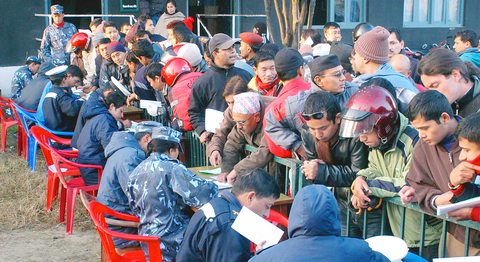Kathmandu was deserted yesterday as police and soldiers enforced a daytime curfew declared by the Nepalese government after a round-up of political activists aimed at heading off anti-king protests.
Some 120 people were detained for breaking the curfew, among them political activists, protesters and civilians, a police officer said.
Most of the civilians would be freed in the evening, he said without clarifying how many activists would remain locked up.

PHOTO: EPA
"Everything is normal, and there have not been any reports of incidents," said the officer, who asked to remain anonymous.
Armed police and soldiers were posted every few hundred meters on main roads, and were stopping and checking the few vehicles on the roads.
Kathmandu's picture-perfect Durbar Square, where seven opposition parties had planned to hold their rally early afternoon, was empty save for police, three holy cows and a troupe of monkeys.
Residents rushed to work before the 8am to 6pm curfew came into effect, but most businesses kept their shutters down as truckloads of police rumbled through the city and soldiers took up positions at key points.
The last time a daytime curfew was imposed in the capital was when King Gyanendra sacked the government and assumed full executive powers on Feb. 1 last year.
On Thursday, security forces detained 107 activists and political leaders and cut mobile telephone services in a crackdown condemned by the US, India, the EU and Japan.
More detentions
Further detentions were reported early yesterday.
"I was placed under house arrest this morning," Bharat Mohan Adhikari, a leader from the Nepal Communist Party (United Marxist Leninist) told AFP by telephone.
"Eleven armed police are stationed in my residence, and I understand that other leaders have also been placed under house arrest," Adhikari said.
Madhav Kumar Nepal, NCP (UML) general secretary, said he, too, was under house arrest.
"Armed police surrounded my house at 4am. They came inside at 6am and at 7:30am a police superintendent came and handed over a warrant," he said.
Nepal's seven main political parties, sidelined by the king's powergrab, had called yesterday's protest to demand the restoration of democracy and to call for a boycott of municipal polls on Feb. 8.
Evening protest?
With the daytime curfew in place and their leaders in detention, political parties were yesterday planning torch-lit processions and protests after 6pm.
"Spontaneous protest programs will be organized inside Kathmandu and [neighboring] Lalitpur once the curfew ends," said Bhanu Bhakta Dhakal, a member of NCP (UML).
For people on the streets, the curfew was an irritant.
"In the name of giving security, the government is creating a difficult time for the general public. I hope this won't last long. I hope this won't last long," said Sadhana Khadgi, a roadside vegetable seller.
Rights groups feared further human rights abuses.
"The government of Nepal should be aware the international community is gravely concerned with developments this week and should take immediate steps to remedy the serious human rights violations that have taken place," Purna Sen of Amnesty International said.

Kehinde Sanni spends his days smoothing out dents and repainting scratched bumpers in a modest autobody shop in Lagos. He has never left Nigeria, yet he speaks glowingly of Burkina Faso military leader Ibrahim Traore. “Nigeria needs someone like Ibrahim Traore of Burkina Faso. He is doing well for his country,” Sanni said. His admiration is shaped by a steady stream of viral videos, memes and social media posts — many misleading or outright false — portraying Traore as a fearless reformer who defied Western powers and reclaimed his country’s dignity. The Burkinabe strongman swept into power following a coup in September 2022

‘FRAGMENTING’: British politics have for a long time been dominated by the Labor Party and the Tories, but polls suggest that Reform now poses a significant challenge Hard-right upstarts Reform UK snatched a parliamentary seat from British Prime Minister Keir Starmer’s Labor Party yesterday in local elections that dealt a blow to the UK’s two establishment parties. Reform, led by anti-immigrant firebrand Nigel Farage, won the by-election in Runcorn and Helsby in northwest England by just six votes, as it picked up gains in other localities, including one mayoralty. The group’s strong showing continues momentum it built up at last year’s general election and appears to confirm a trend that the UK is entering an era of multi-party politics. “For the movement, for the party it’s a very, very big

ENTERTAINMENT: Rio officials have a history of organizing massive concerts on Copacabana Beach, with Madonna’s show drawing about 1.6 million fans last year Lady Gaga on Saturday night gave a free concert in front of 2 million fans who poured onto Copacabana Beach in Rio de Janeiro for the biggest show of her career. “Tonight, we’re making history... Thank you for making history with me,” Lady Gaga told a screaming crowd. The Mother Monster, as she is known, started the show at about 10:10pm local time with her 2011 song Bloody Mary. Cries of joy rose from the tightly packed fans who sang and danced shoulder-to-shoulder on the vast stretch of sand. Concert organizers said 2.1 million people attended the show. Lady Gaga

SUPPORT: The Australian prime minister promised to back Kyiv against Russia’s invasion, saying: ‘That’s my government’s position. It was yesterday. It still is’ Left-leaning Australian Prime Minister Anthony Albanese yesterday basked in his landslide election win, promising a “disciplined, orderly” government to confront cost-of-living pain and tariff turmoil. People clapped as the 62-year-old and his fiancee, Jodie Haydon, who visited his old inner Sydney haunt, Cafe Italia, surrounded by a crowd of jostling photographers and journalists. Albanese’s Labor Party is on course to win at least 83 seats in the 150-member parliament, partial results showed. Opposition leader Peter Dutton’s conservative Liberal-National coalition had just 38 seats, and other parties 12. Another 17 seats were still in doubt. “We will be a disciplined, orderly